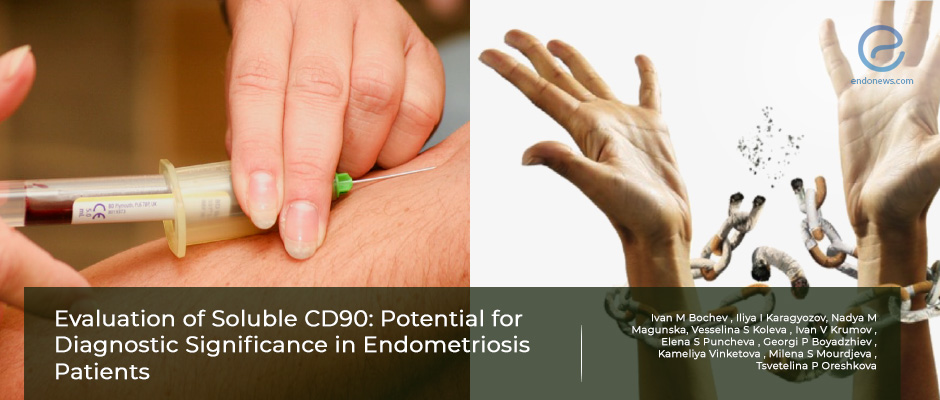Soluble CD90 : a potential serum biomarker in endometriosis
Jul 22, 2022
Is non-invasive diagnostic tests are possible in endometriosis ?
Key Points
Highlights:
- Endometriosis is a common disease of women worldwide, but still lacks a diagnostic serum biomarker, histopathologic evaluation of the surgical material is necessary for the definitive diagnosis.
Importance:
- A unique biomarker, useful in supporting and/or diagnosing endometriosis would be important revolutionary progress in clinical endometriosis diagnosis and management.
What’s done here:
- This study was performed on 57 women, consisting of a control group of healthy women (n = 30) and a group of endometriosis patients (n=27).
- All endometriosis patients had their definitive diagnosis via surgical biopsies.
- Quantitative analysis of soluble CD90/Thy-1 and CD83 in serum samples were made using the commercially available ELISA kits in both groups.
Key results:
- The authors have reported that elevated serum CD90 levels were associated with endometriosis, and this finding could have a valuable impact on screening and/or diagnosis of endometriosis.
- CD83 molecule serum levels do not show a distinct difference between the groups, and it does not have a diagnostic power for predicting endometriosis.
Limitations of the study:
- This study consists of a very limited number of patients, further investigation and validation of diagnostic and/or predictive power of sCD90 in blood specimens should be performed.
Lay Summary
Dr. Bochev and colleagues from several medical centers in Bulgaria published their research on the role of a possible serum biomarker in diagnosing endometriosis in a recent issue of the journal named “Disease Markers”.
The definitive diagnosis of endometriosis, an ailment affecting millions of women worldwide currently depends on visual inspection of lesions in laparoscopy and microscopic examination of surgically excised tissues. This diagnostic approach is invasive, may carry risks of postoperative complications, and also it is not easily accessible to every woman. Hence this situation carries a possible risk of long delay from the onset of symptoms to the definitive diagnosis of endometriosis.
As possible serum biomarkers in the diagnosis of endometriosis, immune mediators are of interest because of the inflammatory nature of this disease process. In this regard, two soluble molecules, CD83 and CD90/Thy-1, may be potential candidates which have not yet been tested in connection with endometriosis.
This study included a total of 57 women, with a control group of healthy volunteers (n = 30) and a group of endometriosis patients (n=27). Endometriosis in patients was diagnosed on clinical symptoms and examination by sonography, laparoscopy, and finally by microscopic examination of surgical biopsies. Serum samples were collected from the volunteers at the time of their consent and from the patients with suspected endometriosis immediately before their diagnostic laparoscopic interventions. Quantitative analysis of soluble CD90/Thy-1 and CD83 in serum samples were made using the commercially available ELISA kits in both groups.
The results of this study show about 70.4% coincidence of sCD90 positive results in patients with endometriosis. The remaining 30% of sCD90-negative patients were predominantly in the stage III endometriosis group.
When the study evaluated the sCD83 molecule serum levels, there was no difference between the two groups, meaning that this molecule has no diagnostic power for predicting endometriosis.
CD90 is involved in basic cellular processes, this study revealed that increased soluble CD90 in serum may be a specific marker that was associated with endometriosis. However, "due to the limited number of patients in this study, further investigation and validation of diagnostic and/or predictive power of sCD90 in serological tests need to be performed", the authors added.
Research Source: https://pubmed.ncbi.nlm.nih.gov/35769819/
endometriosis CD90 CD83 serum biomarker laparoscopy biopsy

